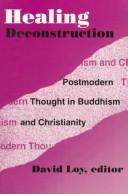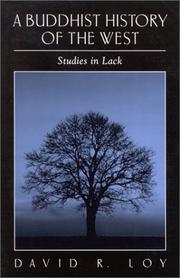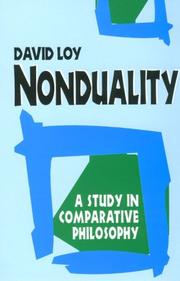| Listing 1 - 10 of 17 | << page >> |
Sort by
|
Book
ISBN: 0300038984 Year: 1988 Publisher: New Haven : Yale University Press,
Abstract | Keywords | Export | Availability | Bookmark
 Loading...
Loading...Choose an application
- Reference Manager
- EndNote
- RefWorks (Direct export to RefWorks)

ISBN: 0788501216 1280845163 0195345487 9780195345483 9786610845163 6610845166 0788501224 9780788501210 9780788501227 9781280845161 Year: 1996 Volume: 3 Publisher: Atlanta, Ga. : Scholars Press,
Abstract | Keywords | Export | Availability | Bookmark
 Loading...
Loading...Choose an application
- Reference Manager
- EndNote
- RefWorks (Direct export to RefWorks)
This collection reflects the confluence of two contemporary developments: the Buddhist-Christian dialogue and the deconstruction theory of Jacques Derrida. The five essays both explore and demonstrate the relationship between postmodernism and Buddhist-Christian thought. The liberating and healing potential of de-essentialized concepts and images, language, bodies and symbols are revealed throughout. Included are essays by Roger Corless, David Loy, Philippa Berry, Morny Joy, and Robert Magliola.
Buddhism --- Christianity and other religions --- Deconstruction --- Postmodernism --- Christianity --- Syncretism (Christianity) --- Religions --- Buddha and Buddhism --- Lamaism --- Ris-med (Lamaism) --- Post-modernism --- Postmodernism (Philosophy) --- Arts, Modern --- Avant-garde (Aesthetics) --- Modernism (Art) --- Philosophy, Modern --- Post-postmodernism --- Relations --- Religious aspects --- History --- Derrida, Jacques --- Derrida, J. --- Derida, Žak --- Derrida, Jackes --- Derrida, Zhak --- Deridah, Z'aḳ --- Deridā, Jāka --- Dirīdā, Jāk --- Деррида, Жак --- דרידה, ז'אק --- Congresses. --- Derrida, Jacques, --- Postmodernism - Religious aspects - Christianity - Congresses. --- Postmodernism - Religious aspects - Buddhism - Congresses. --- Christianity and other religions - Buddhism - Congresses --- Buddhism - Relations - Christianity - Congresses. --- Deconstruction - Congresses. --- Derrida, Jacques, - 1930-2004 - Congresses --- Derrida, Jacques, - 1930-2004

ISBN: 0791489124 0585476217 9780585476216 079145259X 9780791452592 0791452603 9780791452608 9780791489123 Year: 2002 Publisher: Albany State University of New York Press
Abstract | Keywords | Export | Availability | Bookmark
 Loading...
Loading...Choose an application
- Reference Manager
- EndNote
- RefWorks (Direct export to RefWorks)
Buddhism teaches that to become happy, greed, ill-will, and delusion must be transformed into their positive counterparts: generosity, compassion, and wisdom. The history of the West, like all histories, has been plagued by the consequences of greed, ill-will, and delusion. A Buddhist History of the West investigates how individuals have tried to ground themselves to make themselves feel more real. To be self-conscious is to experience ungroundedness as a sense of lack, but what is lacking has been understood differently in different historical periods. Author David R. Loy examines how the understanding of lack changes at historical junctures and shows how those junctures were so crucial in the development of the West.
Self-consciousness (Awareness) --- Identity (Psychology) --- Self (Philosophy) --- Buddhism --- Buddhist philosophy. --- Civilization, Western --- Self-awareness --- Self-consciousness --- Consciousness --- Personal identity --- Personality --- Self --- Ego (Psychology) --- Individuality --- Philosophy --- Buddhist doctrines --- Buddhist theology --- Lamaist doctrines --- Philosophy, Buddhist --- Buddhism and philosophy --- Civilization, Classical --- Civilization, Occidental --- Occidental civilization --- Western civilization --- Doctrines. --- Classical influences. --- Philosophy. --- Psychological aspects.
Book
ISBN: 1441618651 9781441618658 1438426968 9781438426969 Year: 2009 Publisher: Albany, N.Y. State University of New York Press
Abstract | Keywords | Export | Availability | Bookmark
 Loading...
Loading...Choose an application
- Reference Manager
- EndNote
- RefWorks (Direct export to RefWorks)
What do we need to do to become truly comfortable—at one—with our lives here and now? In these essays, Buddhist social critic and philosopher David R. Loy discusses liberation not from the world, but into it. Loy's lens is a wide one, encompassing the classic and the contemporary, the Asian, the Western, and the comparative. Loy seeks to distinguish what is vital from what is culturally conditioned and perhaps outdated in Buddhism and also to bring fresh worldviews to a Western world in crisis. Some basic Buddhist teachings are reconsidered and thinkers such as Nagarjuna, Dogen, Eckhart, Swedenborg, and Zhuangzi are discussed. Particularly contemporary concerns include the effects of a computerized society, the notion of karma and the position of women, terrorism and the failure of secular modernity, and a Buddhist response to the notion of a clash of civilizations. With his unique mix of Buddhist philosophical insight and passion for social justice, Loy asks us to consider when our awareness, or attention, is bound in delusion and when it is unbound and awakened.
Buddhism --- Religion --- Philosophy & Religion --- Buddhist doctrines --- Buddhist theology --- Lamaist doctrines --- Doctrines. --- Doctrines

ISBN: 9781573923590 1573923591 Year: 1999 Publisher: New York: Humanity Books,
Abstract | Keywords | Export | Availability | Bookmark
 Loading...
Loading...Choose an application
- Reference Manager
- EndNote
- RefWorks (Direct export to RefWorks)
Book
ISBN: 9781614293828 1614293821 Year: 2018 Publisher: Somerville: Wisdom Publications,
Abstract | Keywords | Export | Availability | Bookmark
 Loading...
Loading...Choose an application
- Reference Manager
- EndNote
- RefWorks (Direct export to RefWorks)
This landmark work is simultaneously a manifesto, a blueprint, a call to action, and a deep comfort for troubling times. David R. Loy masterfully lays out the principles and perspectives of Ecodharma—a Buddhist response to our ecological predicament, introducing a new term for a new development of the Buddhist tradition.This book emphasizes the three aspects of Ecodharma:practicing in the natural world,exploring the ecological implications of Buddhist teachings,and embodying that understanding in the eco-activism that is needed today.Within these pages, you’ll discover the powerful ways Buddhism can inspire us to heal the world we share. Offering a compelling framework and practical spiritual resources, Loy outlines the Ecosattva Path, a path of liberation and salvation for all beings and the world itself.
Book
ISBN: 9781614295235 1614295239 Year: 2018 Publisher: New York: Wisdom Publications,
Abstract | Keywords | Export | Availability | Bookmark
 Loading...
Loading...Choose an application
- Reference Manager
- EndNote
- RefWorks (Direct export to RefWorks)
Psychotherapy, existentialism, and Buddhism are all concerned with the same fundamental issues of life and death—and death-in-life. David R. Loy’s groundbreaking claim is that the unifying feature connecting these perspectives is a sense of pervasive sense of dissatisfaction—or, in a word, lack. In Lack & Transcendence, he brings all three traditions together in a way that casts new light on each, as he draws from giants of psychotherapy, particularly Freud, Ernest Becker, Rollo May, Irvin Yalom, and Otto Rank; great existentialist thinkers, like Nietzsche, Kierkegaard, Heidegger, and Sartre; and the teachings of Buddhism, especially as interpreted by Nagarjuna, Huineng, and Dogen.Written in accessible style that does not assume prior familiarity with any of its subjects, this book will appeal to readers of all backgrounds, including psychotherapists and psychoanalysts, religious scholars, Continental philosophers, and anyone seeking clarity on the Great Matter itself.The reader will come away with fresh perspectives on ancient questions and deeper insights into the human predilection to be unhappy—and what the liberating alternative may be.
Book
Year: 1996 Publisher: Atlanta Scholars Press
Abstract | Keywords | Export | Availability | Bookmark
 Loading...
Loading...Choose an application
- Reference Manager
- EndNote
- RefWorks (Direct export to RefWorks)

ISBN: 0791452603 079145259X 9780791452608 Year: 2002 Publisher: Albany (N.Y.) : State university of New York press,
Abstract | Keywords | Export | Availability | Bookmark
 Loading...
Loading...Choose an application
- Reference Manager
- EndNote
- RefWorks (Direct export to RefWorks)
Civilization, Western --- Philosophy, Buddhist. --- Buddhism --- Self (Philosophy) --- Identity (Psychology) --- Self-consciousness. --- Psychological aspects. --- Philosophy. --- Classical influences. --- Doctrines. --- Buddhist philosophy. --- Identity (Psychology). --- Self (Philosophy). --- Self-consciousness (Awareness). --- Civilization, Western - Psychological aspects. --- Civilization, Western - Philosophy. --- Civilization, Western - Classical influences. --- Buddhism - Doctrines.
Book
Abstract | Keywords | Export | Availability | Bookmark
 Loading...
Loading...Choose an application
- Reference Manager
- EndNote
- RefWorks (Direct export to RefWorks)
| Listing 1 - 10 of 17 | << page >> |
Sort by
|

 Search
Search Feedback
Feedback About UniCat
About UniCat  Help
Help News
News